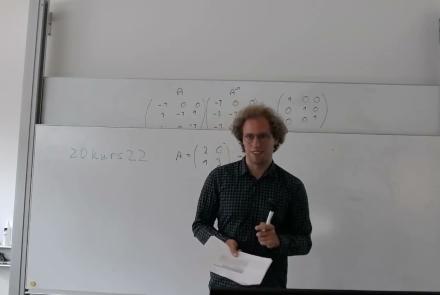Lesson type
Difficulty level
Course:
This lesson gives an introduction to high-performance computing with the Compute Canada network, first providing an overview of use cases for HPC and then a hands-on tutorial. Though some examples might seem specific to the Calcul Québec, all computing clusters in the Compute Canada network share the same software modules and environments.
Difficulty level: Beginner
Duration: 02:49:34
Speaker: : Félix-Antoine Fortin
Course:
This talk presents an overview of CBRAIN, a web-based platform that allows neuroscientists to perform computationally intensive data analyses by connecting them to high-performance computing facilities across Canada and around the world.
Difficulty level: Beginner
Duration: 56:07
Speaker: : Shawn Brown
Course:
This lecture presents an overview of functional brain parcellations, as well as a set of tutorials on bootstrap agregation of stable clusters (BASC) for fMRI brain parcellation.
Difficulty level: Advanced
Duration: 50:28
Speaker: : Pierre Bellec
Introduction of the Foundations of Machine Learning in Python course - Day 01.
High-Performance Computing and Analytics Lab, University of Bonn
Difficulty level: Beginner
Duration: 35:24
Speaker: : Elena Trunz
Optimization for machine learning - Day 02 lecture of the Foundations of Machine Learning in Python course.
High-Performance Computing and Analytics Lab, University of Bonn
Difficulty level: Advanced
Duration: 34:52
Speaker: : Moritz Wolter
Linear Algebra for Machine Learning - Day 03 lecture of the Foundations of Machine Learning in Python course.
High-Performance Computing and Analytics Lab, University of Bonn
Difficulty level: Advanced
Duration: 57.45
Speaker: : Moritz Wolter
Support Vector Machines - Day 06 lecture of the Foundations of Machine Learning in Python course.
High-Performance Computing and Analytics Lab, University of Bonn
Difficulty level: Advanced
Duration: 53.39
Speaker: : Elena Trunz
Decision Trees and Random Forests - Day 07 lecture of the Foundations of Machine Learning in Python course.
High-Performance Computing and Analytics Lab, University of Bonn
Difficulty level: Advanced
Duration: 1:15:39
Speaker: : Elena Trunz
Clustering and Density Estimation - Day 08 lecture of the Foundations of Machine Learning in Python course.
High-Performance Computing and Analytics Lab, University of Bonn
Difficulty level: Advanced
Duration: 59:35
Speaker: : Elena Trunz
Dimensionality Reduction - Day 09 lecture of the Foundations of Machine Learning in Python course.
High-Performance Computing and Analytics Lab, University of Bonn
Difficulty level: Advanced
Duration: 51:02
Speaker: : Elena Trunz
Introduction to Neural Networks - Day 10 lecture of the Foundations of Machine Learning in Python course.
High-Performance Computing and Analytics Lab, University of Bonn
Difficulty level: Advanced
Duration: 54:12
Speaker: : Moritz Wolter
Introduction to Convolutional Neural Networks - Day 11 lecture of the Foundations of Machine Learning in Python course.
High-Performance Computing and Analytics Lab, University of Bonn
Difficulty level: Advanced
Duration: 42:07
Speaker: : Moritz Wolter
Initialization, Optimization, and Regularization - Day 12 lecture of the Foundations of Machine Learning in Python course.
High-Performance Computing and Analytics Lab, University of Bonn
Difficulty level: Advanced
Duration: 42:07
Speaker: : Moritz Wolter
U-Nets for medical Image-Segmentation - Day 13 lecture of the Foundations of Machine Learning in Python course.
High-Performance Computing and Analytics Lab, University of Bonn
Difficulty level: Advanced
Duration: 16:45
Speaker: : Moritz Wolter
Sequence Processing - Day 15 lecture of the Foundations of Machine Learning in Python course.
High-Performance Computing and Analytics Lab, University of Bonn
Difficulty level: Advanced
Duration: 47:45
Speaker: : Moritz Wolter
Course:
This lecture covers FAIR atlases, including their background and construction, as well as how they can be created in line with the FAIR principles.
Difficulty level: Beginner
Duration: 14:24
Speaker: : Heidi Kleven
Course:
EyeWire is a game to map the brain. Players are challenged to map branches of a neuron from one side of a cube to the other in a 3D puzzle. Players scroll through the cube and reconstruct neurons with the help of an artificial intelligence algorithm developed at Seung Lab in Princeton University. EyeWire gameplay advances neuroscience by helping researchers discover how neurons connect to process visual information.
Difficulty level: Beginner
Duration: 03:56
Speaker: : EyeWire
Course:
This module explains how neurons come together to create the networks that give rise to our thoughts. The totality of our neurons and their connection is called our connectome. Learn how this connectome changes as we learn, and computes information.
Difficulty level: Beginner
Duration: 7:13
Speaker: : Harrison Canning
This lecture provides an introduction to the study of eye-tracking in humans.
Difficulty level: Beginner
Duration: 34:05
Speaker: : Ulrich Ettinger
Topics
- Artificial Intelligence (5)
- Philosophy of Science (5)
- Provenance (2)
- Notebooks (1)
- protein-protein interactions (1)
- Extracellular signaling (1)
- Animal models (2)
- Assembly 2021 (27)
- Brain-hardware interfaces (12)
- Clinical neuroscience (10)
- International Brain Initiative (2)
- Repositories and science gateways (5)
- Resources (6)
- General neuroscience
(10)
- Phenome (1)
- (-)
General neuroinformatics
(12)
- Computational neuroscience (81)
- Statistics (2)
- Computer Science (5)
- Genomics (24)
- Data science
(17)
- Open science (23)
- Project management (3)
- Education (2)
- Neuroethics (7)


















